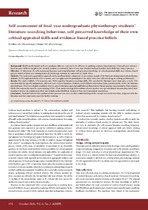| dc.contributor.author | Hess, Danelle | |
| dc.contributor.author | Frantz, Jose M. | |
| dc.date.accessioned | 2018-05-14T12:02:54Z | |
| dc.date.available | 2018-05-14T12:02:54Z | |
| dc.date.issued | 2016 | |
| dc.identifier.citation | Hess, D. & Frantz, J.M. (2016). Self-assessment of final-year undergraduate physiotherapy students’ literature-searching behaviour, self-perceived knowledge of their own critical appraisal skills and evidence-based practice beliefs. African Journal of Health Professions Education, 8(2): 174-177. | en_US |
| dc.identifier.issn | 2078-5127 | |
| dc.identifier.uri | http://dx.doi.org/10.7196/AJHPE.2016.v8i2.580 | |
| dc.identifier.uri | http://hdl.handle.net/10566/3663 | |
| dc.description.abstract | BACKGROUND. Health professionals and new graduates alike are expected to be efficient in applying evidence-based practice. Research and evidencebased
practice skills are taught in the research modules at university, but it is not clear whether students translate those skills into clinical practice.
OBJECTIVE. To determine the self-assessment literature-searching behaviour, self-perceived knowledge of critical appraisal skills and evidence-based
practice beliefs of final-year undergraduate physiotherapy students at a university in South Africa.
METHODS. This study used a quantitative approach, with a small qualitative component. A convenience sample of the final-year undergraduate physiotherapy
students (N=36) registered for the 2012 academic year was approached to participate in the study. Data were collected using an existing questionnaire.
RESULTS. The study yielded a 75% response rate. With regard to literature-searching skills, 30% searched for literature more than once a week, 52%
searched only for specific information and most had access to literature. Students received their information from journal articles (85%), the internet
and databases. They were slightly confident when it came to literature appraisal and believed that evidence-based practice was essential to their practice
(96%), but expressed a need for more training (59%). Their understanding of the evidence-based practice concept was limited because they based their
treatment choices on content and other role-models, and related their choices to their previous patient experiences.
CONCLUSION. Students believed that evidence-based practice was vital, yet their understanding of the concept was restricted when compared with the
literature and they expressed a need for further training. | en_US |
| dc.language.iso | en | en_US |
| dc.publisher | Health and Medical Publishing Group | en_US |
| dc.rights | This open-access article is distributed under
Creative Commons licence CC-BY-NC 4.0. | |
| dc.subject | Evidence-based practice | en_US |
| dc.subject | Clinical practice | en_US |
| dc.subject | Physiotherapy students | en_US |
| dc.subject | South Africa | en_US |
| dc.title | Self-assessment of final-year undergraduate physiotherapy students’ literature-searching behaviour, self-perceived knowledge of their own critical appraisal skills and evidence-based practice beliefs | en_US |
| dc.type | Article | en_US |
| dc.privacy.showsubmitter | FALSE | |
| dc.status.ispeerreviewed | TRUE | |
| dc.description.accreditation | DHET | |

